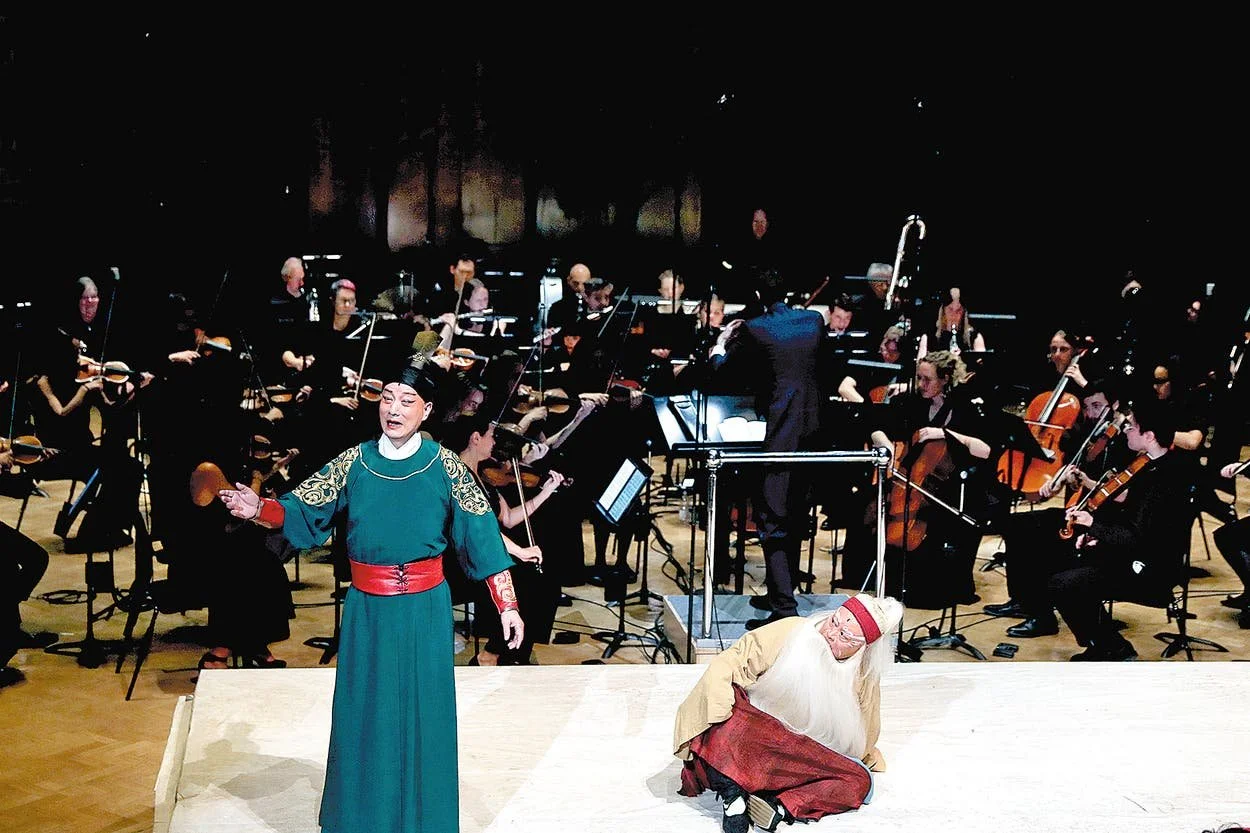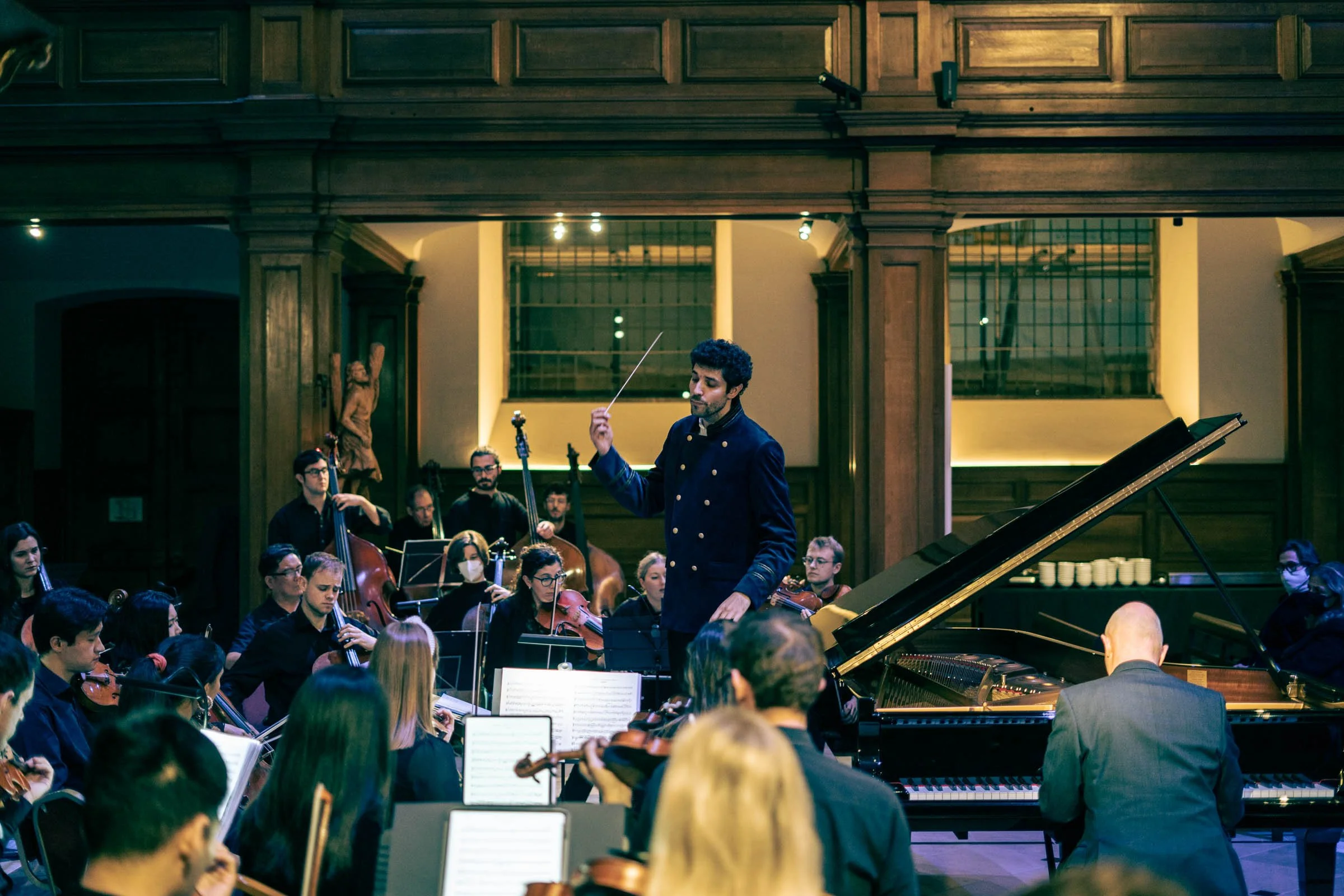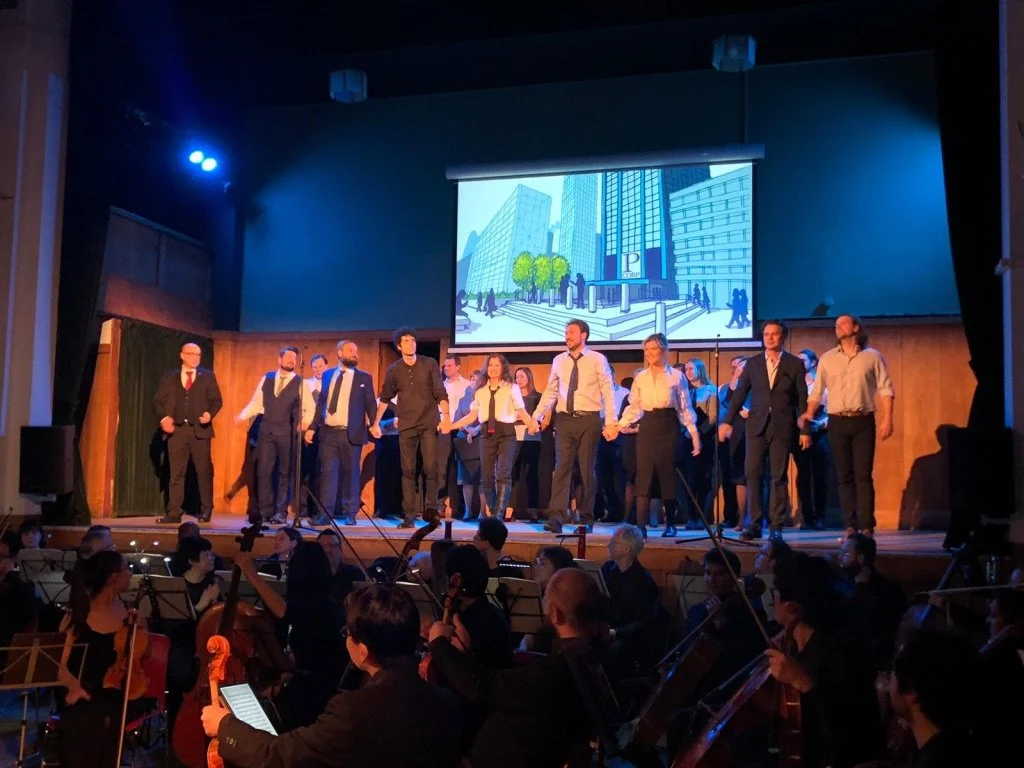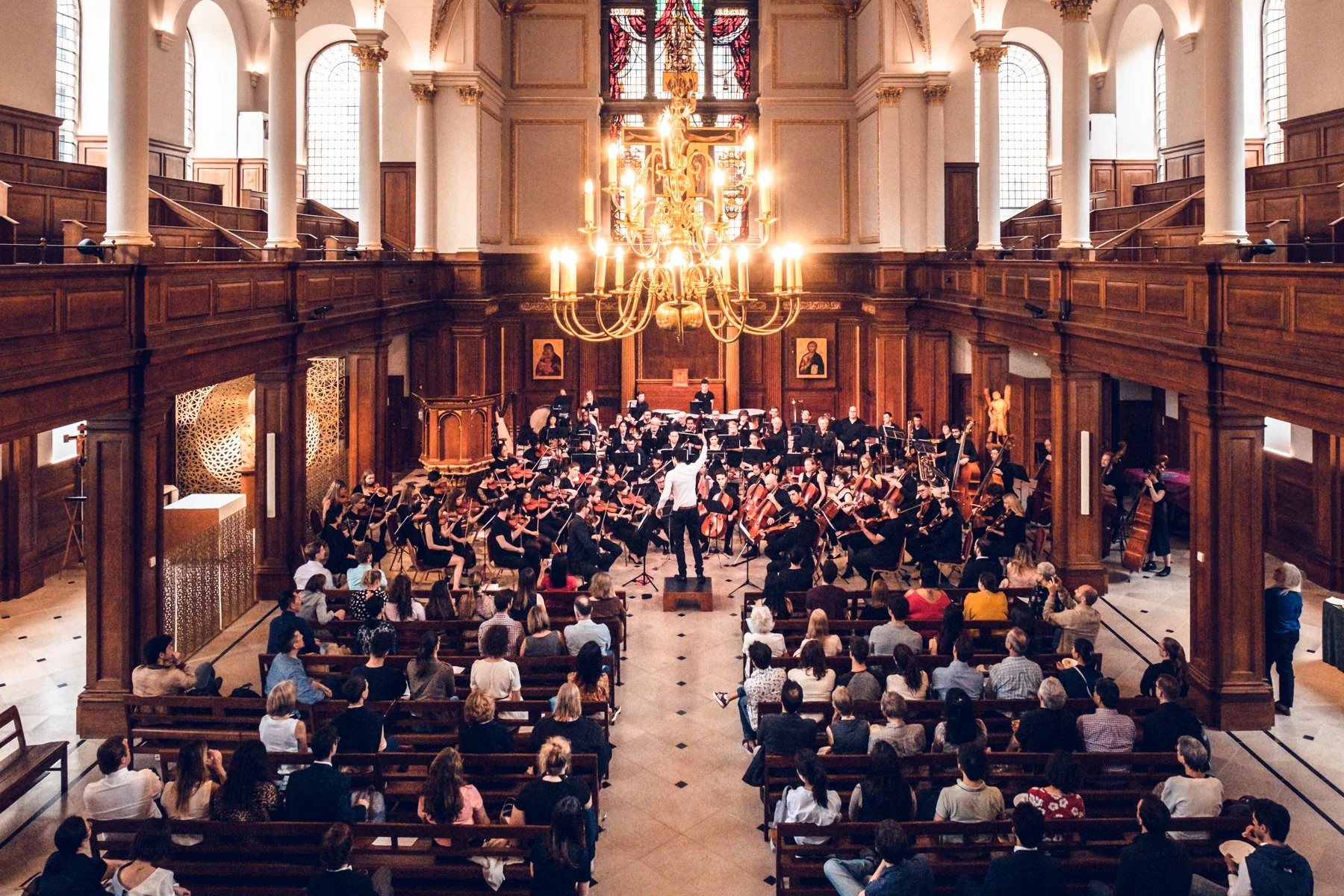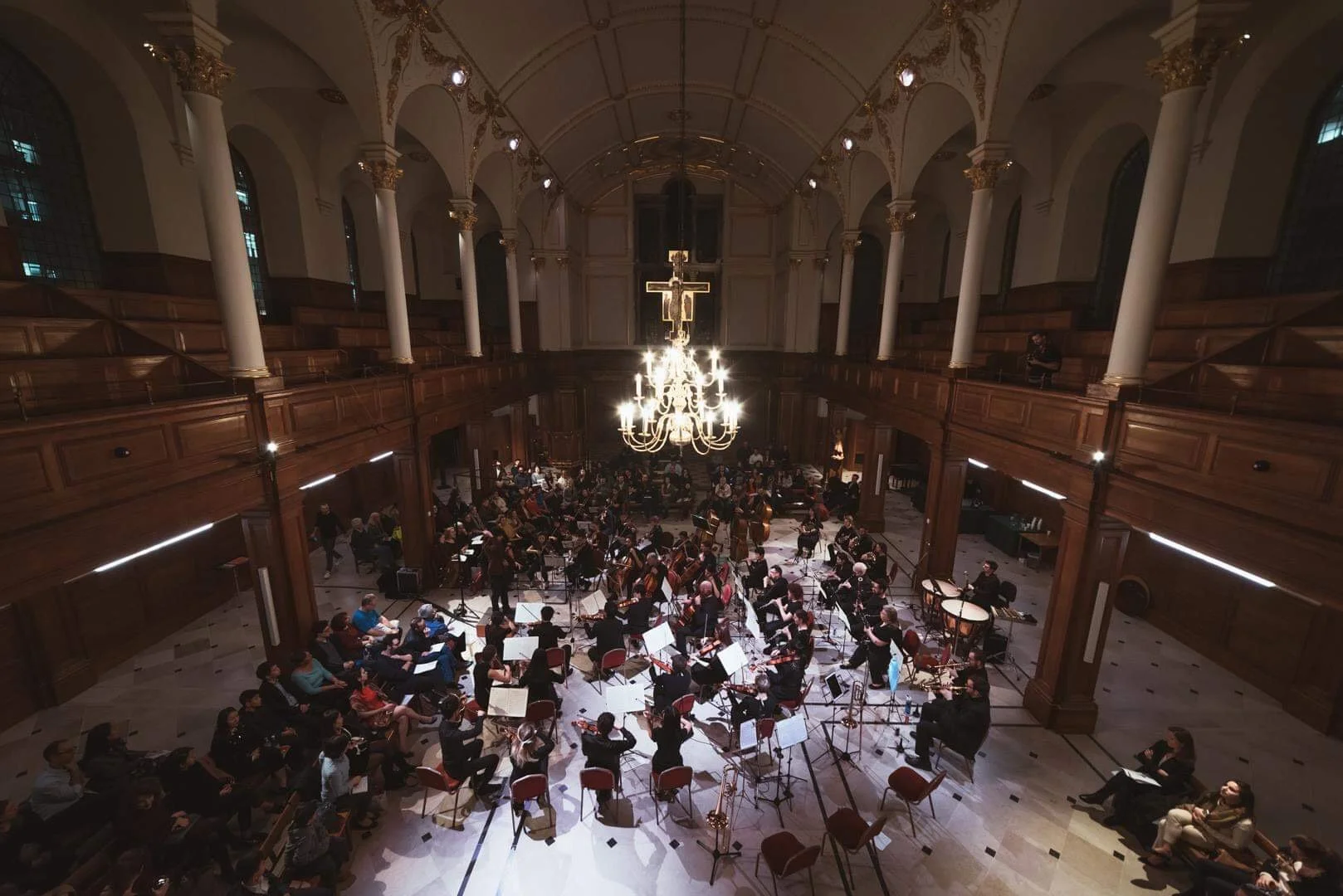Ein Heldenleben with Kristine Balanas
April 2025
For their debut at Milton Court, part of the Barbican Centre, the orchestra paired Mendelssohn's beloved violin concerto with Strauss' Ein Heldenleben. Too often seen as a monument to Strauss's conceit, the piece actually reveals a bourgeois vision of heroism. Strauss reflects on the challenges faced by anyone asserting their talent against the status quo. The ultra-conservative, self-important classical music establishment – especially the critics – served as the nemesis he longed to escape. The final triumph isn’t total victory, but a more mundane reflection on the comfort of a good life.
Metamorphosen
February 2025
A chamber concert launched the 2025 season, possible thanks to the generosity of the sponsors who got together in September 2024 for an unforgettable fundraising gala. This chamber concert included the Oboe Concerto by Alessandro Marcello, played by Fidelio Orchestra's principal oboist Laura Wallace, Grażyna Bacewicz concerto for strings and Richard Strauss' Metamorphosen for 23 strings, a work the Fidelio Orchestra had already presented in 2020, although to closed doors.
Ein Heldenleben & Cai Lun with Chen Xinyi
October 2024
This was a project of a kind! A chinese production company under the direction of CHen Xinyi, the acclaimed chinese theatre director, approached the Fidelio Orchestra for a music and theatre concept bringing together Peking Opera with Richard Strauss. Among a few raised brows, the event sold out to a mostly asian crowd but was a testimony to the power of art to appeal transversally to crowds with diverse backgrounds and tastes. The show took place, with an orchestra in reduced size, at LSO St Luke's.
Fragments of a Lost World
September 2024
A concert collecting three pieces, three fragments of a "lost world", the world of Europe before the First World War, the world of sonatas, symphonies and large scale forms. Starting from Tchaikovsky's Romeo and Juliet via Saint'Säens first cello concerto with Margarita Balanas, to finish with the final movement from Mahler's Third symphony. It was a meditative and moving performance where the huge sound of the large orchestra filled the gorgeous intimate room of St Luke's.
Beethoven’s 4th Concerto with Elisabeth Braussß
June 2024
The Fidelio Orchestra's debut at LSO St Luke's was with classic B+B programme in partnership with German pianist Elisabeth Brauß. The concert marked the beginning of a new era for the orchestra and a considerable step up in performance standards from the previous season.
Brahms with Angela Hewitt
March 2024
A key event in the history of the Fidelio Orchestra was the collaboration with Angela Hewitt for Brahms Piano Concerto No. 1. Angela also lead the orchestra in Bach's D minor piano concerto making it a true D minor Concerto marathon. The concert happened at the church of St Andrew's Holborn to a packed room and was reviewed in the Observer by Fiona Maddocks.
Tchaikovsky’s Pathéetique
September 2023
For its second collaboration with Tiberghien, the Fidelio Orchestra performed a rarely heard work for piano and orchestra, written by a young and fiery Strauss in his early 20s. Among the most fiendish in his repertoire, it also highlights his unique use of the piano as an orchestral voice. Tchaikovsky’s Sixth Symphony, the Pathétique, premiered just nine days before his death. Often seen as a final cry of despair, it’s unlikely that he foresaw his end when publishing it in August 1893. Structurally unusual, it ends not with a triumphant finale but with a slow movement following a vigorous allegro.
Frei aber froh
June 2023
Frei aber froh – free but happy – was Brahms’s witty reply when asked why he never married. He wove this motto into his Third Symphony, composed in 1883, by opening it with the notes F–A♭–F. At the time, he was Vienna’s most celebrated composer and widely seen as Beethoven’s heir. Free from the need for validation, he made this his most personal symphony—an intimate reflection on love, nature, freedom, and individuality, set against the backdrop of fin-de-siècle Austria.
Songs of the Night
February 2023
Buoyed by the performance of the Ninth a few months earlier, the orchestra tackled perhaps its most ambitious concert yet with Mahler’s Seventh. The most virtuosic of his works, the symphony showcases the composer’s dazzling technique through vertiginous orchestral effects, from boisterous brass to chamber-like passages. Written over the summers of 1904 and 1905, it concludes the cycle of his three middle instrumental symphonies (5, 6, and 7). The only other symphonies without voices are the First and the Ninth, forming a symmetrical pattern in Mahler’s output.
Mahler 9
October 2022
For this concert the orchestra ranks swelled to the largest size to date, crowding every nook of the dimly lit church of St Andrew's Holborn. Completed in 1909, Mahler never saw his 9th symphony performed. It is considered by many the last great symphony of the germanic tradition and it presents themes and schemes that somehow seem to both summarise and depart from 250 years of established composing practice.
Grieg with Cedric Tiberghien
July 2022
The first partnership with French pianist Cedric Tiberghien saw the Fidelio Orchestra tackling Grieg's piano concerto and Sibelius' fifth symphony: an entirely Scandinavian programme. The concert was on a very hot late July evening and marked the beginning of a musical friendship with Cedric Tiberghien which continues to bring great music to the orchestra's audience.
Mozart & Beethoven
March 2022
A very classical programme putting togheter Mozart's Haffner symphony with Beethoven's fourth. The orchestra was lead by guest concertmaster Yume Fujitse. Beethoven's fourth symphony, in the words of Raff, is "the one work to understand who Beethoven really was". The concert went down very well for its bubbly and exciting character, brining to life that key transition in style between the XVIII and XIX century.
Schumann with Charles Owen
October 2021
This programme saw the Fidelio Orchestra partnering with pianist Charles Owen, a long-standing collaborator and great friend. Schumann’s piano concerto opened the night, with its assertive candenza followed by some great storytelling in winds and the piano solo. The orchestra went on to perform Brahms' fourth symphony, one of the masterpieces of the entire symphonic repertoire and a piece that summarises the entire classical tradition in four movements. A haunting E minor passacaglia closes the piece with variations probing the full range of facets in the human experience.
Mahler 1
August 2021
The real comeback of the Fidelio Orchestra after the Covid break was on the notes of Mahler's first symphony. This concert was one of the most ambitious events ever put on by the group. The orchestra had not played as a group in over a year and the event also included a sit down dinner service for around 100 people, which required a coordinate team effort from the Fidelio Cafe operational team. The choice of the piece was not incidental: the ambitions of the event itself were matched by the music that Mahler imagined as the work that would present him as a key voice back in the late 1880s.
Metamorphosen in the Locked-Down Cafe
August 2020
In a legendary appearance behind closed door in the middle of the summer, when no venue was allowed to operate, a group of 23 players from the Fidelio Orchestra met in the shut Fidelio Cafe to reflect together on the world having ground to a halt. They did it with Strauss' piece for 23 strings, Metamorphosen: a go-to piece for moments of great change in the history of the world, at least since 1945, years of its composition. The concert was not open to the public but it was recorded and also reviewed in The Arts Desk by David Nice.
Unanswered Questions
February 2020
This programme was to be the last public performance of the orchestra before Coronavirus shat down concert halls and theatres around the world. Almost ironaically, it included Schubert's Unifinished symphony and Charles Ives' The Unanswered Question, for string ensemble and solo trumpet. It closed on the upbeat rhythms of Beethoven's seventh symphony, giving a sense of optimism to the audience, unaware of what was coming.
Fidelio The Opera
December 2019
A milestone to close the first year of activities of the Fidelio Orchestra was to put on Beethoven's opera in a semi-staged production at Conway Hall.
Rome Tour
October 2019
In partnership with a charity established to raise funds to reconstruct the University of Camerino, damaged by the earthquake in 2017, the Fidelio Orchestra travelled to Rome where they played a concert featuring Beethoven's Emperor Concerto and Brahms's second symphony. The concert took place in the beautiful great hall of the University of Rome La Sapienza.
Brahms ^2
September 2019
This programme included two works of the mature Brahms, his Haydn variations for orchestra and the second symphony. Before the concert, Raffaello Morales did a Q&A session with music critic Peter Quantrill about Brahms and his world at the time of the symphony's writing. The concert was followed by drinks at the newly opened Fidelio Cafe ahead of the orchestra's departure for their Italian concert abroad.
Love & Transfiguration
June 2019
This was the first very advanced and demanding project the orchestra put together. A romantic journey through love and its inevitable demise through the lenses of three giants of the nineteenth century: Berlioz, Wagner and Strauss. This is a programme the orchestra definitely wants to revive at some point soon.
Brahms with Samson Tsoy
April 2019
For the first concert together with an international soloists, the orchestra teamed up with Samson Tsoy to tackle Brahms's meaty second piano concerto along with Schumann's second symphony. It is said that Brahms referred to this piece – one that went down in history as perhaps the peak in the genre – as having written 'a tiny little concerto'.
The New Path
February 2019
The Fidelio Orchestra was launched in February 2019 with a concert featuring music by Mozart and Beethoven. Moving from Mozart's last symphony (the Jupiter), it drew the connection with Beethoven's early 2nd symphony and also featured two of the four overtures from Fidelio, the overture from the Opera and the gigantic Overture better known as Leonore no. 3.




